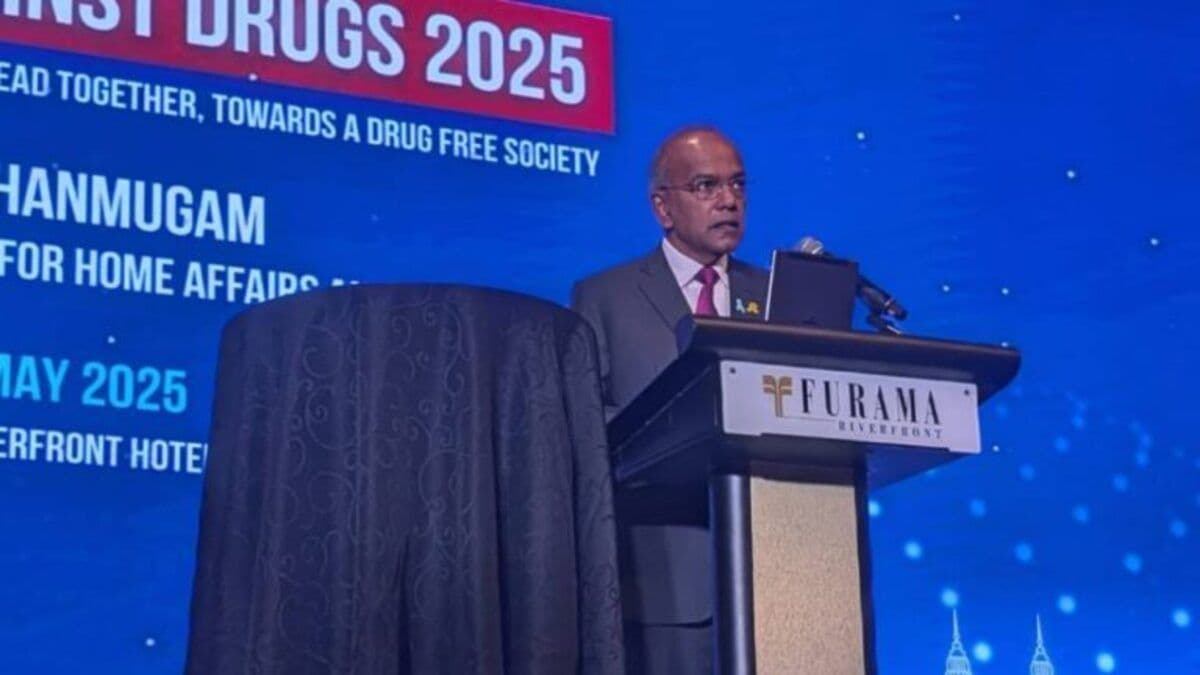Singapore joins new Asia-Pacific NGO coalition to combat drug trafficking and abuse
Singapore has joined a newly formed regional coalition of NGOs, the Asia-Pacific Confederation against Drugs (APCD), to strengthen cross-border collaboration against drug trafficking and abuse. The announcement was made at the 2025 Asia-Pacific Forum Against Drugs in Singapore.

- Singapore is a founding member of the Asia-Pacific Confederation against Drugs (APCD), launched on 15 May 2025.
- Minister K Shanmugam warned about synthetic drugs like fentanyl, cannabis legalisation, and Myanmar’s role in drug production.
- Singapore reiterated its strict anti-drug stance, including the use of capital punishment for traffickers, while supporting regional cooperation.
Singapore has become a founding member of a new regional coalition of non-governmental organisations (NGOs) formed to intensify the fight against drug trafficking and abuse.
The Asia-Pacific Confederation against Drugs (APCD) was announced on 15 May 2025 at the opening of the Asia-Pacific Forum Against Drugs, held at the Furama RiverFront Hotel in Singapore.
The three-day event, running from 15 to 17 May, brought together more than 300 coalition members, correctional officers, NGOs, and officials from across the region.
Building a united front
The APCD’s founding members include organisations from Singapore, Malaysia, Indonesia, the Philippines, and Hong Kong. Singapore is represented by the Singapore Anti-Narcotics Association (SANA).
The coalition aims to promote drug-free societies through education, prevention, and joint programmes, while countering the influence of liberal drug policies worldwide.
Home Affairs and Law Minister K Shanmugam, delivering the keynote address, said the APCD would provide a unified voice and practical collaboration at a time of rising global drug challenges.
“The global drug trade is a multibillion-dollar industry with powerful, vested interests. It exploits the vulnerable, corrupts state institutions, and undermines the will of governments,” he told participants.
Escalating threat of synthetic drugs
Shanmugam warned of the growing dangers posed by synthetic drugs, including fentanyl, methamphetamine, and ketamine. Unlike traditional plant-based drugs, synthetics can be produced in makeshift laboratories, making them cheaper to manufacture and harder to control.
He highlighted recent developments in the region, including Malaysia’s detection of fentanyl traces in sewage systems in March, signalling local abuse.
Drawing from U.S. statistics, Shanmugam noted that between 2018 and 2022, more than 250,000 people died from fentanyl overdoses. In 2022 alone, the United States saw 200 fentanyl-related deaths each day.
He said the cumulative toll has already exceeded the number of American lives lost in World War II, the Korean War, the Vietnam War, and the Afghanistan conflict combined.
Closer to home, Shanmugam identified Myanmar as one of the world’s largest synthetic drug producers, warning that organised crime networks based there were fuelling regional instability.
“This situation has serious implications for both the region and the world,” he said.
Concerns over cannabis legalisation
Beyond synthetics, Shanmugam expressed strong concern over the growing global trend toward cannabis legalisation.
He cited a 2022 United Nations report estimating that there were 228 million cannabis users worldwide, warning that increased availability and commercialisation were driving demand.
Despite research linking cannabis use to irreversible brain damage and psychiatric disorders, he said commercial interests were promoting the drug as safe.
Shanmugam compared this to the tactics of the tobacco industry in the 1990s, when companies downplayed health risks and marketed flavoured products to youth.
“They ran advertisements of doctors saying smoking was good for health. They even introduced flavoured cigarettes to make it more appealing to the younger generation,” he noted.
He also referenced a recent Central Narcotics Bureau (CNB) operation in Singapore that seized cannabis-infused chocolate bars and candies packaged in colourful wrappers with cartoon characters.
“They look innocent, they look enticing. But they cause immense harm. Imagine if children find and consume them,” he said.
Statistics from the CNB showed that in 2024, more than half of new cannabis abusers arrested were under the age of 30, reflecting increasing permissiveness among younger Singaporeans.
Balancing medicinal use with regulation
Shanmugam acknowledged that there were arguments in favour of cannabis for medicinal purposes, often raised in international forums such as the United Nations.
However, he stressed that Singapore would only consider such use if backed by strong medical evidence.
“I won’t support it if it is some company profiting from the use of cannabis that wants to legalise it without any controls, and is trying to do it in the form of candy to 10-year-olds,” he said.
Singapore’s uncompromising stance
Singapore remains one of the strictest jurisdictions in the world on drug policy. Shanmugam reiterated that the death penalty is primarily reserved for drug traffickers, reflecting the government’s view that traffickers profit from the suffering of others.
He argued that deterrence through clear laws had been a critical factor in maintaining Singapore’s relatively low levels of drug abuse compared to many countries.
“Challenging as it may be, we have to press on because we have morality and right on our side, and it is the right thing to do,” he said.
He concluded by emphasising the human dimension: “Every time we steer a person away from drugs, we save a life. And the lives of many more—their families, loved ones, and children.”
Regional and global cooperation ahead
The APCD’s formation marks a new stage in regional collaboration, giving NGOs across Asia-Pacific a platform to share resources, coordinate responses, and strengthen prevention campaigns.
Delegates at the forum also stressed the importance of correcting misinformation, particularly online, where narratives favouring drug legalisation have gained traction.
By aligning community organisations, the APCD hopes to build resilience against these influences and sustain public education across diverse societies.







